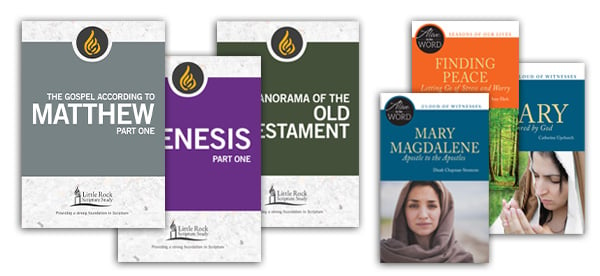There are stories and passages in Scripture that are so familiar to us that we tend to put them in the “been-there-done-that” file in our minds. We may tune out a bit while they are read at Mass or skim over them if we’re reading on our own. St. Jerome, a true lover of holy writ, insightfully pointed out that while the faithful are appalled when a crumb of the Eucharistic bread falls to the floor, we frequently let God’s Word—which is also the body and blood of Christ—fall past our ears without even noticing. Over the years, I’ve certainly let that Word fall past my eyes, ears, heart, and mind many, many times. So I’ve put some thought into ways to read and listen to Scripture more attentively, and I’d like to share a few ideas with you here.
Tip #1: Read out loud.
When we read the Bible to ourselves, it is all too easy to skim over words, phrases, or sentences without even realizing it. If you read out loud—slowly—you will probably notice things you never noticed before. One day when my oldest daughter was about six, she decided she wanted to help me prepare for a lecture. I was studying the symbolism of blood in the Old Testament and was about to read Exodus 24:1-8, so I asked her to read it out loud to me. You can imagine that a six-year-old would have trouble with some of the biblical vocabulary. As she read slowly, sounding out some words as best she could, I had no choice but to listen to every word and phrase in slow motion. And I couldn’t believe the amazing details in the passage (I’ll never forget the “basins” of blood!). You should check it out! Slowly!
Tip #2: Translate or paraphrase.
If you speak another language, try translating a Scripture passage into that language (or from that language into English). Write it down so you are carefully choosing each word. As a grad student, I had to do my share of Latin translations. My first Scripture translation was from Luke 1—a short section introducing the birth of John the Baptist. I wondered why the professor had chosen this passage. Why not something more exciting? But it actually turned out to be very interesting—I learned things about Elizabeth and Zechariah that I never knew before, even though I had read Luke 1 many times. I guess I had already decided that all I needed to know about Zechariah and Elizabeth was that they were righteous and barren. That was pretty arrogant (and lazy) of me!
If you don’t speak another language, try paraphrasing the passage into your own words. Moving from “Bible-speak” to your own way of speaking is a type of translation that still requires you to slow down and think about each word or phrase. Don’t worry about a “perfectly accurate” translation—the point is to think about the words and their meaning. Try this with a psalm, and watch it come to life.
Tip #3: Pick out a word or phrase.
A classic technique, used in some methods of Lectio Divina, is to read or listen to Scripture with your heart open to a particular sacred word or phrase. The idea is that in a given reading, there may be one thing that really stands out and has a special meaning for you. For example, in Psalm 23, perhaps the word “restores” catches your attention, or the phrase “darkest valley.” Then ask yourself why this phrase means something to you in the context of the passage as a whole and in the context of your life. Hopefully, this reflection will ignite a conversation between you and God. This technique helps you pay attention to the scriptures you are reading or hearing because you are looking for or listening for that special word or phrase. This is a nice technique to use when listening to the scriptures at Mass when, let’s face it, our minds sometimes wander.
Tip #4: Take the time and energy to apply to your life.
We always listen to or read Scripture with the intention of applying it to our lives. We know that if the message just sits on the pages of the Bible, or just rattles around in our brains, it doesn’t do us (or anyone else) much good. But sometimes we don’t follow through—we don’t really give ourselves the time and the quiet to process what we’ve read or heard. This is the hard work that allows God’s Word to bear fruit.
In the parish where I used to work, we had a summer prayer series exploring different prayer methods. One week we discussed praying with Scripture, and I encouraged the participants to try it at home during the week. The next time we met, I asked how it went. One parishioner shared a challenging experience. She had decided to pray over the Mass readings of the day—an excellent idea. The problem was that as she eagerly read the first reading, ready to ponder and pray, she quickly became discouraged. The reading was about Moses killing an Egyptian (Exod 2:11-15). What to do with a Bible hero committing murder? How to apply it to one’s life? All I could say is that sometimes we have to get creative. God’s Word is living and active all right—it is full of darkness and sin as well as light and love. We talked about looking below the surface to consider the motivation behind Moses’ act: his love for his people that mirrored God’s own love. While this does not necessarily justify what Moses did, it does provide a lot to pray about. There is also the fruitful notion that even Moses—arguably the greatest prophet of the Old Testament—could be a hot-head. Some scriptures are difficult to apply to our lives. Doing so requires practice, patience, and sometimes, spiritual creativity!
I’m sure you all have your own ideas about how to read or hear God’s Word without letting even a crumb fall to the ground. Share them with us at Little Rock Scripture Study by replying to this email, or if viewing on Facebook, in the comments below!
 Connections Archive
Connections Archive


